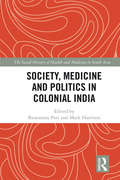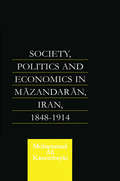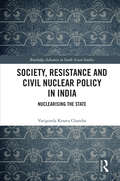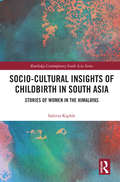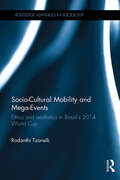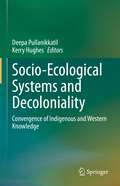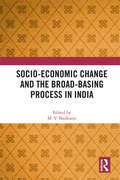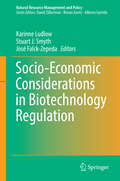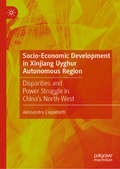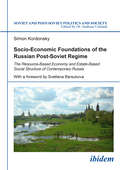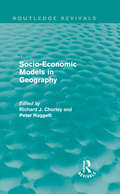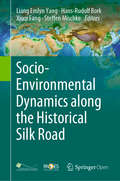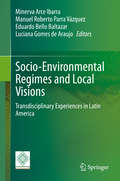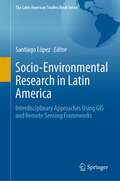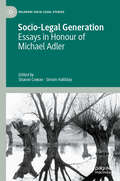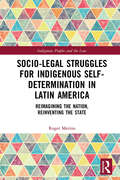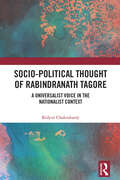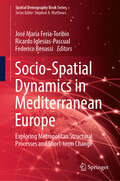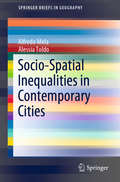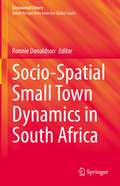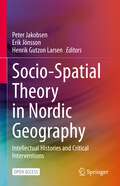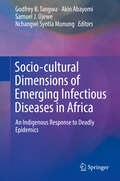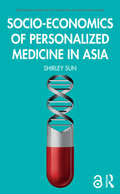- Table View
- List View
Society, Medicine and Politics in Colonial India (The Social History of Health and Medicine in South Asia)
by Mark Harrison Biswamoy PatiThe history of medicine and disease in colonial India remains a dynamic and innovative field of research, covering many facets of health, from government policy to local therapeutics. This volume presents a selection of essays examining varied aspects of health and medicine as they relate to the political upheavals of the colonial era. These range from the micro-politics of medicine in princely states and institutions such as asylums through to the wider canvas of sanitary diplomacy as well as the meaning of modernity and modernization in the context of British rule. The volume reflects the diversity of the field and showcases exciting new scholarship from early-career researchers as well as more established scholars by bringing to light many locations and dimensions of medicine and modernity. The essays have several common themes and together offer important insights into South Asia’s experience of modernity in the years before independence. Cutting across modernity and colonialism, some of the key themes explored here include issues of race, gender, sexuality, law, mental health, famine, disease, religion, missionary medicine, medical research, tensions between and within different medical traditions and practices and India’s place in an international context. This book will be of great interest to scholars and researchers of modern South Asian history, sociology, politics and anthropology as well as specialists in the history of medicine.
Society, Politics and Economics in Mazandaran, Iran 1848-1914 (Caucasus World)
by Mohammad Ali KazembeykiThis book is the first major study of provincial history in the Qajar period. Drawing extensively on unpublished Iranian and British documents, it explores the history of Mazandaran, a province in the Caspian region, during 1848-1914, when the province as a part of Iran was exposed to the policies of rival great powers, particularly Tzarist Russia. While showing socio-economic characteristics of Mazandaran and its potential for development, the book examines in detail the transformation of the traditional provincial community and economy in the course of the 19th and early 20th centuries.
Society, Representation and Textuality
by Sukalpa Bhattacharjee C Joshua ThomasSociety, Representations and Textuality: The Critical Interface brings together papers from various critical perspectives of Humanities and Social Sciences. The work (a) takes stock of the recent developments in critical theory and cultural studies; (b) studies the impact of these developments on the understanding of social reality and the human predicament in India; and (c) brings together scholars from North East India who are engaged in the project of understanding society and communities in their chosen intellectual practice. The book is the first-ever attempt to establish a dialogic encounter between critical practices in Humanities and Social sciences, hitherto considered to be autonomous in their own disciplinary boundaries. Further, the volume addresses issues of identity and autonomy of a multicultural India, particularly with reference to the interface between hegemonic cultures and politically and culturally persistent smaller communities. A significant feature of this book is its attempt to theorize and describe the myriad manifestations of the critical interface between society and literary or cultural productions.
Society, Resistance and Civil Nuclear Policy in India: Nuclearising the State (Routledge Advances in South Asian Studies #1)
by Varigonda Kesava ChandraThis book explores how anti-nuclear social movements impact the state’s civil nuclear policy and its implementation by presenting a historical-comparative case study of anti-nuclear movements in India. Drawing on social movement theory and empirical methods, the book demonstrates that the ability for anti-nuclear movements to impede the inception of nuclear plants – a key element of India’s civil nuclear policy – is determined by the movement’s collective action repertoires, the politicisation of nuclear power and the state’s larger developmental paradigm, and the openness of state input structures. The case studies of anti-nuclear movements in Haripur, Kudankulam and Kovvada demonstrate how the implementation of civil nuclear policy is also determined by the state’s technical and financial capacity and effective international collaboration. With a focus on theorisation of social movements and their impact, combined with empirical studies of anti-nuclear movements, as well as the historical trajectory of civil nuclear development, the book adds a new prism to the study of India’s civil nuclear policy and anti-nuclear opposition. It will be of interest to researchers working on social movements, state-society relations, energy studies and civil nuclear energy in the context of South Asia and the Global South.
Socio-Cultural Insights of Childbirth in South Asia: Stories of Women in the Himalayas (Routledge Contemporary South Asia Series)
by Sabitra KaphleThis book analyses the significant socio-cultural factors impacting childbirth experiences of women living in remote and complex social settings. This book challenges the notion that childbirth is a universal biological event which women experience in their reproductive lives and provides an in-depth social perspective of understanding childbirth. Drawing on evocative stories of women living in the Himalayas, the author discusses how childbirth should be supported to enable women to take control and ownership of their experiences. Based on extensive research undertaken in remote mountain regions of Nepal, the book provides evidence for and discussion of childbirth in the context of other countries, cultures and communities. Utilising a feminist perspective, this book critiques medical control of childbirth and argues in favour of giving power to women so that they can make decisions which are right for them. In doing so, the author unpacks complexities associated with women’s lives in remote communities and highlights the significance of addressing broader determinants impacting birth outcomes and valuing childbirth traditions to ensure cultural safety for women, families and societies. Through exploring the wide range of factors influencing women and their childbirth experiences, this book offers a new model for childbirth that policy makers, practitioners, communities, educators, researchers and other professionals can use to make childbirth an empowering experience for women. It will be of interest to academics and professionals in the fields of public health, midwifery, health promotion, sociology and South Asian Studies.
Socio-Cultural Mobility and Mega-Events: Ethics and Aesthetics in Brazil’s 2014 World Cup (Routledge Advances in Sociology)
by Rodanthi TzanelliIn June 2014, Brazil opened the twentieth FIFA World Cup with a spectacular ceremony. Hosting the World Cup was a strategic developmental priority for Brazil: mega-events such as these allow the country to be ranked amongst the world’s political and economic leaders, and are supposed to propel the country to its own unique modernity. But alongside the increased media attention and publicity, came accusations of governmental ‘corruption’ and overspending. In Socio-Cultural Mobility and Mega-Events, Tzanelli uses Brazil’s 2014 World Cup to explore how mega-events articulate socio-cultural problems. Critically examining the aesthetics and ethics of mobilities in the mega-event, this book explores these socio-cultural issues and controversies: the background of staging mega-events, including the bidding process and the host’s expectations for returns; ceremonial staging and communications between artistic representations and national symbolism; the clear reaction mega-events almost always generate in national, regional and global activist circles, including accusations of overspending and human rights violations. This interdisciplinary study will appeal to scholars and students of the sociology of mobility, sociology of globalisation, cultural sociology, social and anthropological theory, as well as the sociology of sport, human and cultural geography, and leisure and tourism studies.
Socio-Ecological Systems and Decoloniality: Convergence of Indigenous and Western Knowledge
by Deepa Pullanikkatil Kerry HughesThis contributed volume provides case studies from around the world that feature a convergence of indigenous and western knowledge in an attempt to understand complex socio-ecological systems. The book provides an understanding of socio-ecological systems in an ethical space using a 'Decoloniality' approach (i.e. untangling the production of knowledge from a primarily Eurocentric episteme). The work presented here integrates and merges indigenous knowledge with western science, thereby building on the strengths of each in service of understanding these systems. The editors of this volume approach indigenous communities and scientists as equal knowledge-holders and, in doing so, contributes towards improved understanding of socio-ecological systems and interactions in cross-cultural contexts. This volume will be of interest to scientists, instructors, students and policy makers across disciplines such as environmental sciences, social sciences, interdisciplinary studies, cultural studies, ethnobotany, anthropology and plant genetic resources.
Socio-Economic Change and the Broad-Basing Process in India
by M. V. NadkarniThis book offers a new concept of inclusion of the marginalised in India — the Broad-basing Process. The author examines how through this process increasing numbers of marginalised social groups can enter into the social, political and economic mainstream and progressively derive the same advantages from society as the groups already part of it. The book critically reviews how the broad-basing process has worked in the past in India both before and after its independence. It examines how social groups like Dalits, OBCs, Muslims, women and the labour class have fared, and how far economic development, urbanisation, infrastructure development and the digital revolution have helped the marginalised and promoted broad-basing. It also offers mechanisms to speed up broad-basing in poorer economies. A first of its kind, this volume will be useful for scholars and researchers of political studies, sociology, exclusion studies, political economy and also for general readers.
Socio-Economic Considerations in Biotechnology Regulation
by Karinne Ludlow Stuart J. Smyth José Falck-ZepedaWithin the context of the Convention on Biological Diversity (CBD), the Cartagena Protocol on Biosafety (CPB) was established as an implementing agreement. The CPB is an international agreement establishing the rights of recipient countries to be notified of and to approve or reject the domestic import and/or production of living modified organisms (LMOs). Decisions regarding import/production are to be on the basis of a biosafety assessment. Article 26. 1 of the CPB allows for the (optional) inclusion of socio-economic considerations (SECs) into that biosafety assessment process. This book compiles expert assessments of the issues relevant to SEC assessment of LMOs and fundamental for decisions regarding whether to undertake such assessments at all. It includes an overview of the inclusion of SEC assessment in the regulation of LMOs that looks at the rationale for the inclusion of SECs, in the context of the existing science-based risk assessment systems. This book reviews the various factors that can and have been suggested for inclusion in SEC assessment, and provides a meaningful dialogue about the contrasts, benefits and tradeoffs that are, and will, be created by the potential move to the inclusion of SECs in the regulation of LMOs, making it of interest to both academics and policy-makers.
Socio-Economic Development in Xinjiang Uyghur Autonomous Region: Disparities and Power Struggle in China’s North-West
by Alessandra CappellettiIn an unprecedented exploration of space and power in rural Xinjiang, a Chinese region home to the Muslim population of the Uyghurs, this book adopts a grounded theory approach and a trans-ethnic perspective into the complex and sensitive topic of land issues and agricultural land evictions in Xinjiang Uyghur Autonomous Region. By exposing the dynamics of land acquisition and power building in the politically contested space of the region, the author shows how state owned land in a key commercial and cultural hub on the new Silk Road became a commodity, in a context of violent human interactions driven by power. Relying on previously undisclosed material and on a unique field research among farmers and local authorities, the author retraces the steps of Uyghur peasant workers, entangled in a suspended situation between abandoned rural villages, migration and urban alienation, in a book which explores agency in violent processes of social change, and adds concepts and insights to the current knowledge of how we become modern citizens. The microcosm of Kashgar, an oasis-city in Xinjiang, acts as a mirror reflecting socio political dynamics framing people’s identity. Shedding light on one of the most inaccessible region in China, this book is a key read for academics and a broader public willing to get a clearer view of one of the sourest power struggle in the most contested region within the next superpower.
Socio-Economic Foundations of the Russian Post-Soviet Regime: The Resource-Based Economy and Estate-Based Social Structure of Contemporary Russia
by Simon KordonskySimon Kordonsky divides the social structure of contemporary Russia into distinct estates or social groups and describes each organization's unique resource-based political and economic nature. As he guides readers through Russia's peculiar service and support estate system, Kordonsky reveals how remarkably effective inventing and institutionalizing threats can be in the distribution of scarce resources in a social system of this kind. His book emphasizes the fundamental differences between resource-based economies and traditional risk-based economies and their role in Russia's future.
Socio-Economic Foundations of the Russian Post-Soviet Regime: The Resource-Based Economy and Estate-Based Social Structure of Contemporary Russia (Soviet and Post-Soviet Politics and Society #152)
by Simon KordonskySimon Kordonsky divides the social structure of contemporary Russia into distinct estates or social groups and describes each organization's unique resource-based political and economic nature. As he guides readers through Russia's peculiar service and support estate system, Kordonsky reveals how remarkably effective inventing and institutionalizing threats can be in the distribution of scarce resources in a social system of this kind. His book emphasizes the fundamental differences between resource-based economies and traditional risk-based economies and their role in Russia's future.
Socio-Economic Models in Geography (Routledge Revivals)
by Richard J. Chorley and Peter HaggettFirst published in 1968, this book explores the theme of geographical generalization, or model building. It is composed of seven of the chapters from the original Models in Geography, published in 1967. The first chapter broadly outlines this theme and examines the nature and function of generalized statements, ranging from conceptual models to scale models, in a geographical context. The following six chapters deal with socio-economic building in geography. They focus on demographic and sociological models as well as looking at special aspects of models in human geography in reference to economic development, urban geography and settlement location, industrial location, and agricultural activity. This book represents a robustly anti-idiographic statement of modern work in one of the major branches of geography.
Socio-Environmental Dynamics along the Historical Silk Road
by Liang Emlyn Yang Hans-Rudolf Bork Xiuqi Fang Steffen MischkeThis open access book discusses socio-environmental interactions in the middle to late Holocene, covering specific areas along the ancient Silk Road regions. Over twenty chapters provide insight into this topic from various disciplinary angles and perspectives, ranging from archaeology, paleoclimatology, antiquity, historical geography, agriculture, carving art and literacy. The Silk Road is a modern concept for an ancient network of trade routes that for centuries facilitated and intensified processes of cultural interaction and goods exchange between West China, Central Asia, the Middle East, and the Mediterranean. Coherent patterns and synchronous events in history suggest possible links between social upheaval, resource utilization and climate or environment forces along the Silk Road and in a broader area. Post-graduates in studying will benefit from this work, as well as it will stimulate young researchers to further explore the role played by the environment in long-term socio-cultural changes.
Socio-Environmental Regimes and Local Visions: Transdisciplinary Experiences in Latin America
by Minerva Arce Ibarra Manuel Roberto Parra Vázquez Eduardo Bello Baltazar Luciana Gomes de AraujoThis book presents oral histories, collective dialogues, and analyses of rural and indigenous livelihoods facing global socio-environmental regime change in Latin America (LA). Since the late twentieth century, rural and indigenous producers in LA, including agriculturists, coffee-growers, as well as small-scale farmers/fishers, and others, have had to resist, cope with, or adapt to a range of neoliberal socio-environmental regimes that impact their territories and associated resources, including water, production systems and ultimately their cultural traditions. In response, rural producers are using local visions and innovation niches to decide what, when, and how to resist, cope with uncertainty, and still be successful in using their customary laws to retain their land rights and livelihoods.This book presents a range of ethnically diverse case studies from LA, which addresses socio-environmental, educational, and law regimes’ effects using transdisciplinary research approaches in rural, traditional and indigenous production systems. Based on both, the results and insights gained into how producers are resisting and adapting to these regimes, as well as decades of research carried out in LA rural territories by the participating authors, the book puts forward a baseline for devising new public policies that are better suited to the real challenges of livelihoods, poverty, and environmental degradation in LA. These recommendations are rooted in post-development thinking; they promote territorial public policy with social inclusion and a human’s rights approach. The book draws on over 20 years of research carried out by LA’s academics and their undergraduate and graduate students who have addressed collaborative work, participatory research, and transdisciplinary approaches with rural commons and communities in LA. It features 19 case studies, with contributions from Argentina, Bolivia, Brazil, Colombia, Cuba, Honduras, and Mexico.
Socio-Environmental Research in Latin America: Interdisciplinary Approaches Using GIS and Remote Sensing Frameworks (The Latin American Studies Book Series)
by Santiago LópezThis contributed volume presents relevant examples of socio-environmental research that highlight the challenges and opportunities of using geotechnologies in interdisciplinary settings across the vast, culturally, and environmentally mega-diverse region known as Latin America. While remote sensing has been mostly used for mapping and monitoring physical features, geographic information systems open up opportunities for the integration of socio-economic and environmental data collected through individual and community-based surveys, in-situ measurements, and other participatory research techniques to offer additional analytically grounded power when evaluating socio-environmental processes that shape Latin American landscapes. The topics addressed in this book include deforestation and land degradation, borderlands dynamics, agriculture and agroecological systems, environmental conservation and development, public health, tourism, environmental justice, archeology, volunteered geography and urban planning, among others. The book is intended for academics, graduate and undergraduate classrooms, and general audiences with interest in Latin America and the socio-environmental issues that threaten the sustainability of the region and local communities. The book will also appeal to practitioners, managers, and policy makers interested in the application of geo-technologies and field-based research to address complex socio-environmental problems in the Global South.
Socio-Legal Generation: Essays in Honour of Michael Adler (Palgrave Socio-Legal Studies)
by Simon Halliday Sharon CowanThis book honors the diverse and path-breaking work of Michael Adler, a pioneer of socio-legal scholarship in the UK. The book brings together an international group of scholars—established and emerging researchers from across the globe—to develop key ideas generated by Adler’s scholarship. Building on his rich portfolio of creative work at the interface of law and social science, the book explores themes that continue to resonate in contemporary debates about how best to understand the relationship between justice, fairness, and the modern administrative state. Specifically, the book re-examines core issues which Adler, as a key figure of the first generation of UK socio-legal scholars, explored, including: the relationship between official discretion and the rule of law; the justice of internal administrative processes; the importance of a ‘bottom up’ perspective on justice; power and accountability in the prison sector; access to justice for social welfare claimants; and the promise of viewing law through the lens of social science.
Socio-Legal Struggles for Indigenous Self-Determination in Latin America: Reimagining the Nation, Reinventing the State (Indigenous Peoples and the Law)
by Roger MerinoThis book is an interdisciplinary study of struggles for indigenous self-determination and the recognition of indigenous’ territorial rights in Latin America. Studies of indigenous peoples’ opposition to extractive industries have tended to focus on its economic, political or social aspects, as if these were discrete dimensions of the conflict. In contrast, this book offers a comprehensive and interdisciplinary understanding of the tensions between indigenous peoples’ territorial rights and the governance of extractive industries and related state developmental policies. Analysing the contentious process pushed by indigenous peoples for implementing pluri-nationality against extractive projects and pro-extractive policies, the book compares the struggle for territorial rights in Bolivia, Ecuador and Peru. Centrally, it argues that indigenous territorial defenses against the extractive industries articulate a politics of self-determination that challenges coloniality as the foundation of the nation-state. The resource governance of the nation-state assumes that indigenous peoples must be integrated or assimilated within multicultural arrangements as ethnic minorities with proprietary entitlements, so they can participate in the benefits of development. As the struggle for indigenous self-determination in Latin America maintains that indigenous peoples must not be considered as ethnic communities with property rights, but as nations with territorial rights, this book argues that it offers a radical re-imagination of politics, development, and constitutional arrangements. Drawing on detailed case studies, this book’s multidisciplinary account of indigenous movements in Latin America will appeal to those with relevant interests in politics, law, sociology and development studies.
Socio-Political Thought of Rabindranath Tagore: A Universalist Voice in the Nationalist Context
by Bidyut ChakrabartyThis book is a political biography of Rabindranath Tagore. It identifies the principal threads in Tagore’s ideational universe and discusses them with reference to his written treatises. The book looks at the issues that made Tagore a thinker of visions and were complementary to the uplift of humanity regardless of race, religion and ethnicity. According to Tagore, religion, caste and gender were the major deterrents to the socio-cultural uniformity of contemporary India. He championed an ideational vision castigating those socio-cultural practices which impaired the coming together of human beings. The book also analyses his debate with Gandhi and the contestations around ideas of nation, industrialism and colonial exploitation.An important addition to the study of Tagore’s politico-ideological views, the volume will be of great interest to scholars and researchers of history, political science, literature, nationalism, sociology and South Asian studies.
Socio-Spatial Dynamics in Mediterranean Europe: Exploring Metropolitan Structural Processes and Short-term Change (Spatial Demography Book Series #3)
by José María Feria-Toribio Ricardo Iglesias-Pascual Federico BenassiThis book analyses the most recent socio-territorial trends that are developing in the Spanish metropolitan space. The first part focuses on the most recent metropolitan dynamics and demographic changes in Southern Europe. The second part discusses the most important processes in metropolitan areas: the problems of increasing social and residential vulnerability and the problems of diversity management. The third part analyses some concrete cases of the main changes and complexity in the spatial dynamics of metropolitan areas in Southern Europe. Finally, the fourth and last part provides an overview on the instruments and the resources put in place by some Southern European cities for the development of governance and citizen participation as an instrument of reaction to the social, economic and COVID crisis. By discussing the main changes and uncertainties derived from the social scenarios after the pandemic, the dynamics of social dualisation of the city, as well as the necessaryinstruments for its analysis and the main challenges in urban governance with special attention of Southern European context, this book provides an interesting read for spatial demographers, human geographers, social scientists and spatial planners.
Socio-Spatial Inequalities in Contemporary Cities (SpringerBriefs in Geography)
by Alfredo Mela Alessia ToldoThe book explores social inclusion/exclusion from a socio-spatial perspective, highlighting the active role that space assumes in shaping social phenomena. Unlike similar books, it does not discuss exclusion and inclusion in particular geographical contexts, but instead explains these phenomena starting from the dense and complex set of relationships that links society and space. It particularly focuses on social differences and how the processes of exclusion and inclusion can produce a highly spatialized understanding of them, for example when particular groups of people are perceived as being out of place.At the same time, within the context of the different approaches that policies adopt to contrast the phenomena of social exclusion, it examines the role of participation as an instrument to promote bottom-up inclusion and cohesion processes.
Socio-Spatial Small Town Dynamics in South Africa (GeoJournal Library)
by Ronnie DonaldsonThis book explores small town geographical aspects by approaching them from a socio-spatial perspective. The contributions included in this book delve into a range of topics that have not been commonly studied before, such as white privilege, neglect of municipal infrastructure, collaborative governance, livelihoods in small-scale fisheries, housing provision, well-being in mining towns, studentification in rural contexts, election trends, and the historical development of small-town spas. The book adopts a socio-spatial point of view, providing a holistic understanding of the interplay between social and spatial factors within selected small town case studies. This approach sheds light on the socio-economic, political, and cultural dynamics that shape small towns. This localized perspective allows for a more targeted analysis of issues and potential solutions, taking into account the specific historical, cultural, and political contexts of small town South Africa. The edited volume serves as a valuable resource for academics, policymakers, practitioners, and anyone interested in understanding and improving small towns in South Africa.
Socio-Spatial Theory in Nordic Geography: Intellectual Histories and Critical Interventions
by Henrik Gutzon Larsen Peter Jakobsen Erik JönssonThis open access book is about socio-spatial theory in, and the nature of, Nordic geography. From both historical and contemporary perspectives, the book engages with theorisations of geography in the Nordic countries. Including chapters by geographers from Denmark, Finland, Iceland, Norway and Sweden, it reflects how theories about the relations between the social and the spatial have been developed, adopted and critiqued in Nordic human geography in relation to a wide range of themes, concepts and approaches. The book also traces institutional developments, distinct geographical traditions and intellectual histories, as well as authors’ own experiences as geographers in and beyond the Nordic area. The chapters together introduce and engage with debates and discussions that permeate Nordic geography and allows readers a glimpse of geographical thinking and the role of socio-spatial theory in the Nordic countries. By providing insights into how geographical ideas emerge, travel and are translated and adapted in specific contexts, the book contributes to debates about historical-geographical situatedness and theorisations of geography.
Socio-cultural Dimensions of Emerging Infectious Diseases in Africa: An Indigenous Response to Deadly Epidemics
by Godfrey B. Tangwa Akin Abayomi Samuel J. Ujewe Nchangwi Syntia MunungThis volume examines the most important socio-cultural, political, economic, and policy issues related to emerging infectious diseases in Africa. The volume covers the work of the Global Emerging Pathogens Treatment Consortium (GET); it looks at the challenges of science education and communication in Africa, the global health and governance of pandemics and epidemics, and more. It looks beyond such threats as Ebola, SARS, and Zika to consider the ways communities have sought to contain these and other deadly pathogens. The chapters provide a better understanding of a global health problem from an African perspective, which help clarify to readers why some responses have worked while others have not. Overall, the volume captures the state of the art, science, preparedness, and evolution of a topic important to the health of Africa and the world. It has a broad appeal across disciplines, from medical science and biomedical research, through research ethics, regulation and governance, science and health communication, social sciences, and is also of interest to general readers.
Socio-economics of Personalized Medicine in Asia
by Shirley SunThe second decade of the twenty-first century has witnessed a surging interest in personalized medicine with the concomitant promise to enable more precise diagnosis and treatment of disease and illness, based upon an individual’s unique genetic makeup. In this book, my goal is to contribute to a growing body of literature on personalized medicine by tracing and analyzing how this field has blossomed in Asia. In so doing, I aim to illustrate how various social and economic forces shape the co-production of science and social order in global contexts. This book shows that there are inextricable transnational linkages between developing and developed countries and also provides a theoretically guided and empirically grounded understanding of the formation and usage of particular racial and ethnic human taxonomies in local, national and transnational settings.
